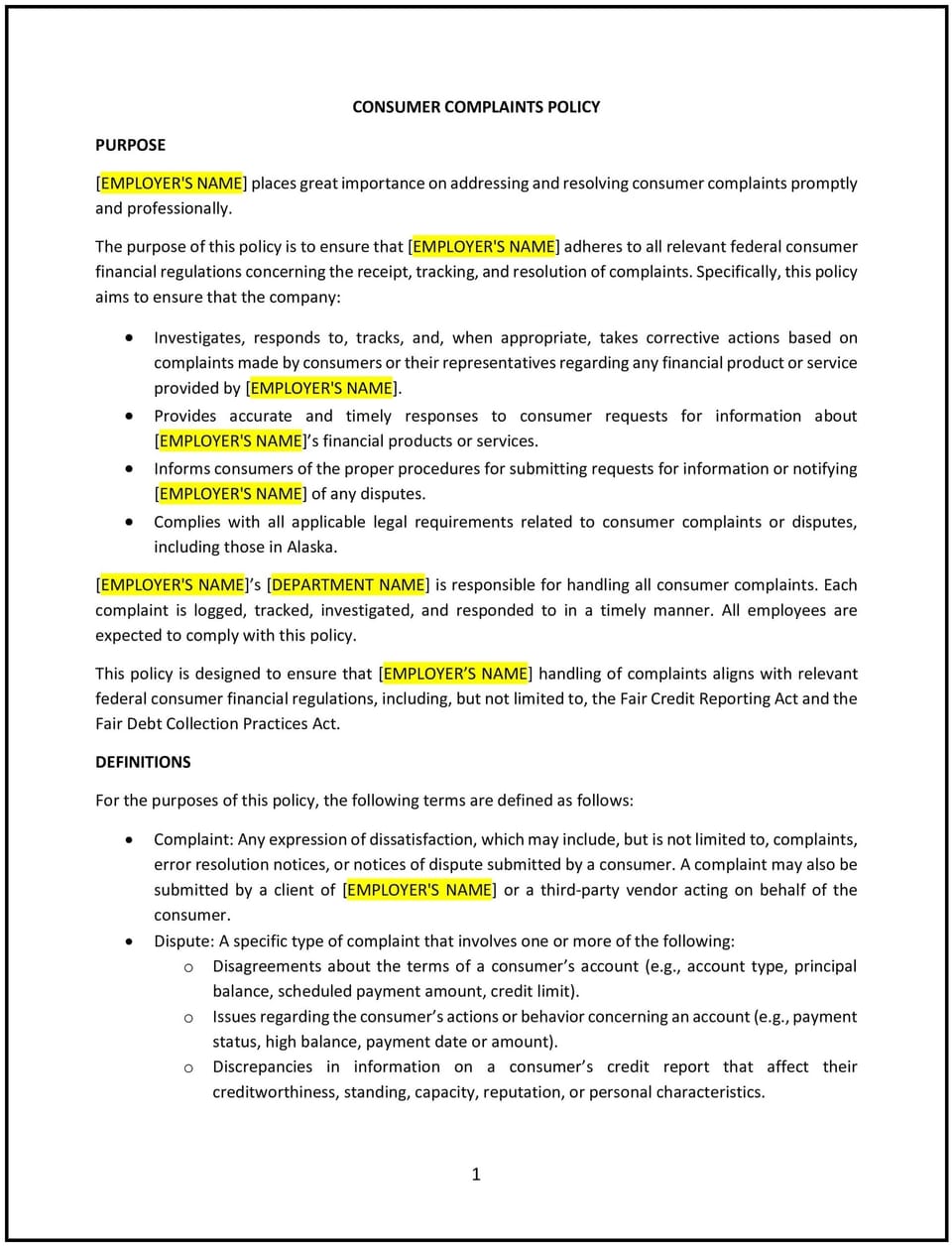Consumer complaints policy (Alaska): Free template

Consumer complaints policy (Alaska)
In Alaska, a consumer complaints policy establishes clear procedures for handling customer feedback, concerns, and disputes. This policy ensures that businesses can address consumer complaints promptly and professionally, fostering trust and maintaining strong customer relationships. By implementing a structured approach, businesses can resolve issues effectively while protecting their reputation and supporting compliance with applicable laws.
Given Alaska's unique conditions, such as remote service areas and diverse industries like tourism, fishing, and retail, businesses may need to adapt their policies to address logistical challenges or specific consumer expectations.
How to use this consumer complaints policy (Alaska)
- Define the scope: Clearly state what types of complaints are covered under the policy, such as product defects, service dissatisfaction, or billing disputes.
- Provide reporting channels: Offer multiple ways for consumers to submit complaints, including phone, email, in-person, or through an online portal, to ensure accessibility.
- Establish response timelines: Specify how quickly complaints will be acknowledged and resolved, ensuring timely and transparent communication with consumers.
- Outline investigation procedures: Describe the steps your business will take to investigate and address complaints, including escalation processes for unresolved issues.
- Promote training: Train employees on how to handle complaints professionally and empathetically, ensuring consistency in interactions with customers.
Benefits of using a consumer complaints policy (Alaska)
A consumer complaints policy provides significant advantages for businesses in Alaska. Here’s how it helps:
- Protects the company’s reputation: Demonstrates a commitment to customer satisfaction by addressing concerns promptly and professionally.
- Builds customer trust: Provides consumers with a reliable process for resolving issues, fostering long-term loyalty and positive relationships.
- Supports compliance: Helps businesses meet industry-specific and general regulatory requirements for handling customer complaints.
- Reduces legal risks: Mitigates the likelihood of disputes escalating to legal claims by resolving complaints early and effectively.
- Improves operational insights: Identifies recurring issues through complaint tracking, enabling businesses to make data-driven improvements to products or services.
Tips for using a consumer complaints policy (Alaska)
- Focus on accessibility: Ensure the reporting process is straightforward and available across multiple channels to accommodate Alaska’s remote and diverse population.
- Track complaints: Use a system to log and analyze complaints, identifying trends or recurring issues that may require broader operational changes.
- Address cultural considerations: Be sensitive to cultural differences when handling complaints, particularly when serving Alaska Native communities or diverse populations.
- Review and refine: Regularly update the policy to reflect changes in consumer expectations, business operations, or regulatory requirements.
- Empower employees: Provide front-line staff with the tools and authority to resolve common complaints quickly, minimizing escalation.
Q: What types of consumer complaints should this policy cover?
A: The policy should address issues such as product defects, billing errors, service dissatisfaction, or any other concerns impacting the consumer experience.
Q: How can consumers submit complaints?
A: Consumers should have access to multiple channels, such as phone, email, in-person visits, or online submission forms, to ensure their concerns can be reported easily.
Q: What is the recommended timeline for resolving complaints?
A: Businesses should aim to acknowledge complaints within 24-48 hours and resolve them within a reasonable timeframe, depending on the complexity of the issue.
Q: How can I use complaint data to improve my business?
A: By tracking and analyzing complaint trends, you can identify recurring issues and make targeted improvements to your products, services, or internal processes.
Q: How does this policy support compliance?
A: The policy supports compliance by providing a structured process for addressing consumer concerns, reducing the risk of regulatory violations or legal disputes.
This article contains general legal information and does not contain legal advice. Cobrief is not a law firm or a substitute for an attorney or law firm. The law is complex and changes often. For legal advice, please ask a lawyer.


